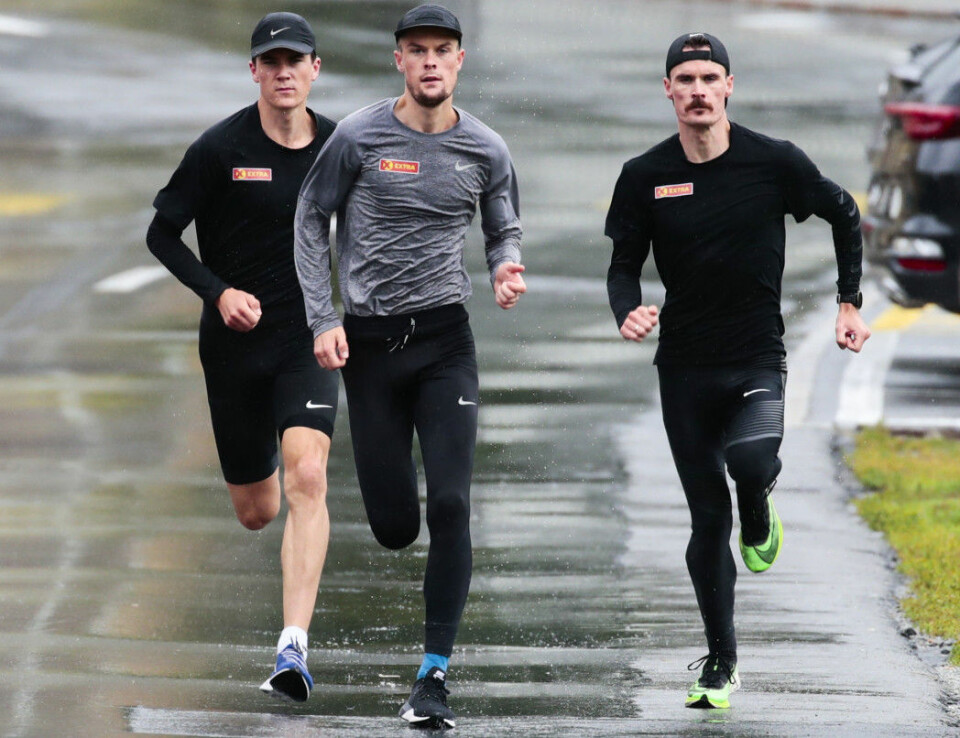
What is the secret to the Ingebrigtsen brothers’ success?
Researcher claims to have the answer. Unfortunately, it's not a recipe for just anybody to replicate.
Henrik, Filip and Jakob Ingebrigtsen are three Norwegian brothers who have all also been European 1500-metre champions.
What does it take to be this good? And how can three athletes from the same family be as good as they are?
Leif Inge Tjelta at the University of Stavanger has studied these exact questions.
Tjelta looked through exercise diaries, observed training sessions and interviewed the brothers, their mother, Tone and their father, Gjert, who is also their coach. The results of his study have just been published in the International Journal of Sports Science and Coaching.
Exercise, training and more training
First and foremost: To be the best you have to train. A lot.
And the Ingebrigtsen brothers have, from when they were children, through their teens and into adulthood. No exceptions.
Tjelta says that all three brothers participated in sports from childhood, which he believes has been important to their success. The two elder brothers played football, skied and participated in track and field events. The youngest brother, Jacob, started running as early as seven years old. But it took a long time for him to be able to keep up with his two older brothers.
“Jacob has been with and trained with them since he was 12, but he has not trained as much as them. He didn't do that until he was 17-18 years old,” says Tjelta.
This progression, where the amount of exercise gradually increases with age, has been important, Tjelta said.
“The brothers have a father who has understood how training works. After trial and error, he figured out what worked best, and now they have found a training regimen that works well for them,” says Tjelta.
Not too much hard training
At the same time, the brothers have continuously monitored their blood lactic acid levels while exercising, which lets them know how high the intensity of the workout is. This helps them maintain the correct intensity during each training session and not run too hard — or too slowly.
But they still run a lot. In advance of the 2018 and 2019 seasons, all three brothers ran between an average of 140 and 160 kilometres a week.
Between 23 and 25 per cent of their training sessions took place at a pace above or just below their anaerobic threshold, which is the highest workload a person can tolerate and still have stable lactic acid levels in the blood, as defined by the Norwegian Lexicon.
That is the equivalent of a training intensity where you run at a fast pace, but without your legs feeling stiff, or slightly below your interval pace. Maintain that pace for 40 kilometres. Every week.
But the reality is that most elite athletes train this hard. So what’s the x-factor that makes the three brothers perform so well?
Strong genes, strong family
"They've been lucky with their genes — they must have been," Tjelta says.
Of course it takes more than good genes, though.
This is where family and mental strength come into the picture.
“When you hear an interview with the brothers, you never hear them say ‘yes, but’. They are always on the offensive. If they go out on the field, they think they are going to win,” says Tjelta, in explaining what it means to be mentally strong.
“These three brothers are highly motivated, they like to compete and they have competed all their lives. They have always trained to be the best — which can mean two sessions each day, and never saying something ‘I'm a little tired today, so I'm only going to do one session’,” he says.
In addition, the researcher underscores the importance of the Ingebrigtsen family. Jakob, Filip and Henrik told the researcher that their parents have always encouraged — not pushed — them to compete.
In addition, they emphasized how important it has been that their mother, girlfriends, wives and siblings have supported them through thick and thin.
And not least: Training as a trio of brothers has probably been crucial.
“We are competitors, brothers and good friends. We push each other during our training,” says one of the brothers in the study.
Not suitable for everyone
So what can we ordinary everyday athletes learn from the Ingebrigtsen brothers' daily training? Not much, unfortunately.
“You can try to follow their exercise programme, but there’s no hope of getting just as good,” Tjelta says. “Top performance in endurance sports is only partly a product of a hard workout programme.”
Nevertheless, while not everyone can be as good as the Ingebrigtsens, everyone can get much fitter, says Tjelta, who for a few years back worked on a research project in which untrained people were able to improve their fitness enough to run a half marathon after five months.
Source:
Tjelta, L.I: Three Norwegian brothers all European 1500 m champions: What is the secret? International Journal of Sports Science & Coaching. (2019)
———































